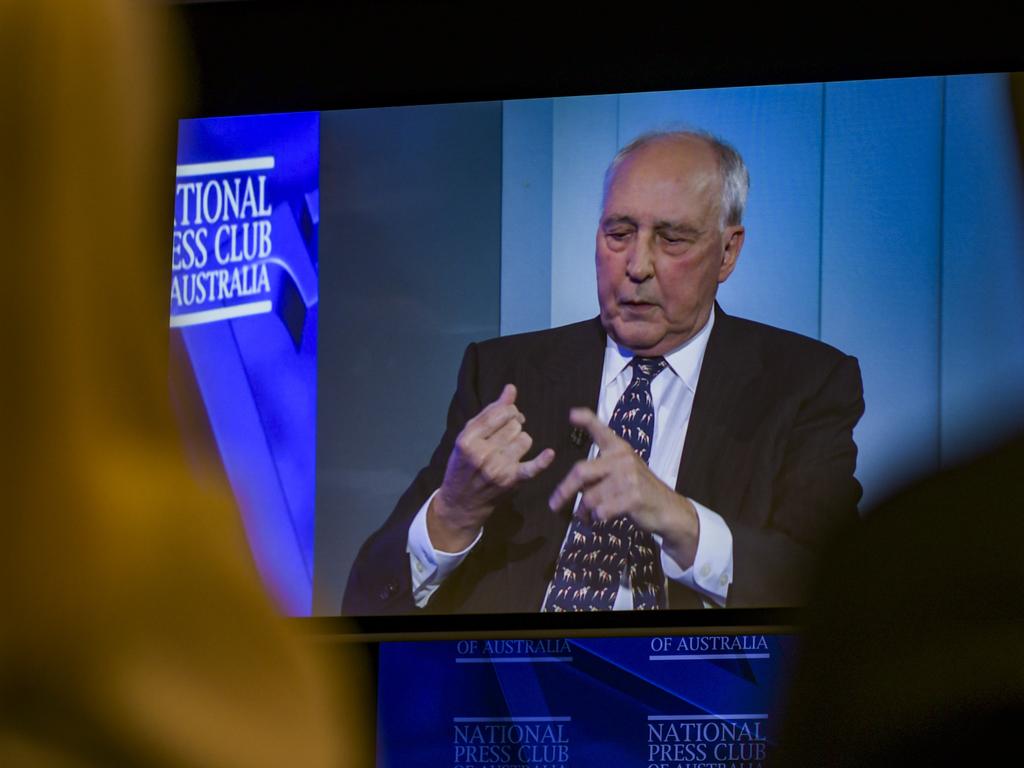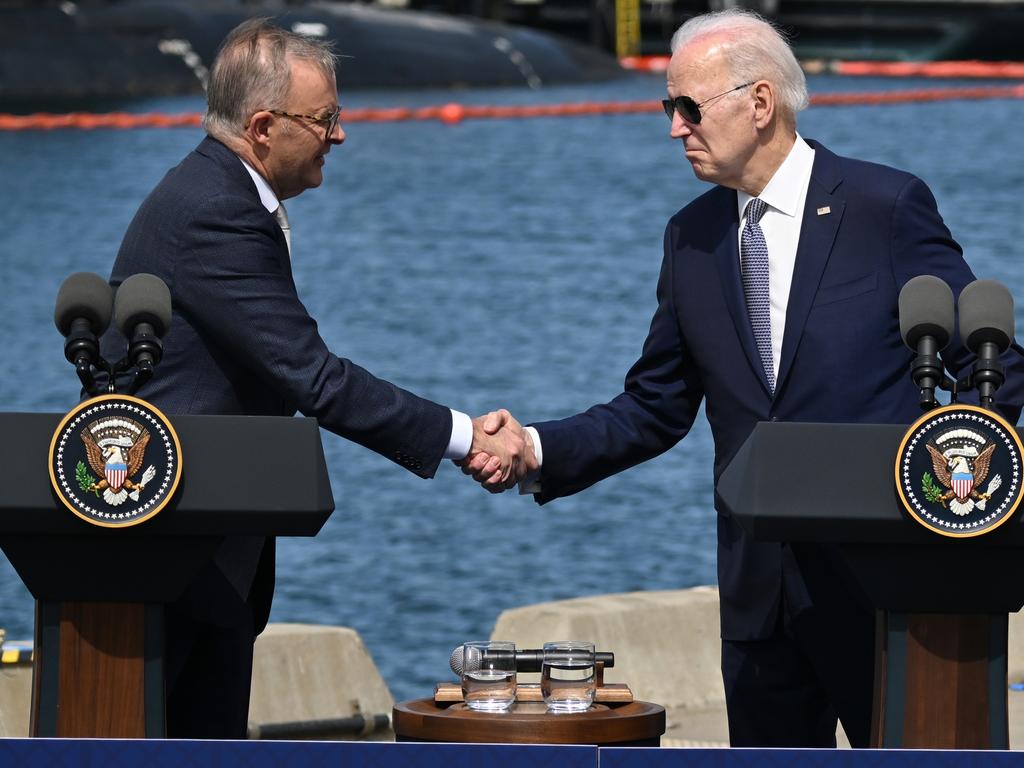The program spent much of last Monday and Tuesday interviewing Coalition leaders, foreign policy academics and military supporters of AUKUS before unleashing former prime minister Paul Keating’s address from ABC’s Ultimo HQ to the National Press Club that day as the lead to Wednesday night’s program.
Yet 7.30 had the advantage of political editor and ABC board candidate Laura Tingle also being president of the press club.
Club chief executive Maurice Reilly told this column negotiations for Keating’s appearance started on February 24. Most of the Canberra gallery had known of Anthony Albanese’s US trip to launch AUKUS with US President Joe Biden and UK PM Rishi Sunak since mid February.
So when planning its AUKUS coverage for the week, the program would have known Wednesday night’s coverage would be dominated by Keating, and any government reaction to his spray.
Defence Minister Richard Marles spoke after Tingle’s Keating segment that night. Tingle’s hosting of Keating may partly explain the program’s decision to invite Opposition Leader Peter Dutton to discuss AUKUS on Monday night and AUKUS’s original conceiver, former prime minister Scott Morrison, on Tuesday night.
The program’s executives may have been concerned to appear balanced ahead of what they knew would be Keating’s attempt to firebomb the entire project. While 7.30 may have been surprised by Keating’s attack on the PM, Marles and Foreign Minister Penny Wong, it knew Keating’s views on AUKUS. Keating had previously slammed AUKUS at the National Press Club in 2021.
As this column noted in a piece on February 12 on 7.30’s coverage of Covid, the program often invites guests it knows will reinforce its own positions. It did the same last week. When the ABC interviewed former national security adviser Hugh White on Tuesday night it knew it would be getting a strong pro-China voice.
With White was Allan Behm, now also with the left-wing Australia Institute. Tingle’s eight-minute segment included one centrist voice, Rory Medcalf, head of the Australian National University’s National Security College, but no serious critic of China’s military expansion in the South China Sea.
Neither in Wednesday night’s 7.30 segment nor during her hosting of questions beamed in to Keating from the Canberra club’s venue did Tingle challenge some of Keating’s fruitier assertions. It was similar to the respect always shown former PMs Malcolm Turnbull and Kevin Rudd on 7.30 but seldom extended to former Coalition PMs John Howard and Tony Abbott.
This newspaper’s Greg Sheridan pointed to the more obvious Keating blunders, such as the assertion he had persuaded Wong not to launch The Sydney Morning Herald international editor Peter Hartcher’s book or endorse it on the cover. Sheridan, many Sky News commentators and the Nine newspapers highlighted Keating’s failure to criticise China’s treatment of the Uighers.
SMH editor Bevan Shields defended Hartcher, national correspondent Matthew Knott and the Nine newspapers’ three-part series Red Alert that started on March 7. This column admires and knows Hartcher and Knott, even if Red Alert was over-hyped and – as Keating said – too much weight given to prominent China hawks. Even so, the series got closer to the truth of China’s recent actions than Keating, 7.30, ABC’s Media Watch or Tingle at the press club.
Sheridan pointed to the biggest flaw in Keating’s logic: his citing of AUKUS as an idea to prevent a land invasion of Australia. Sheridan said this had never been mentioned and was really a World War II view.
Keating’s was a classic straw man political tactic. Australian intelligence and defence sources are concerned about the vulnerability of our open economy to Chinese trade route interference. And they know our fossil fuel and iron exports terminals are often remote and vulnerable.
Keating did not name his substantive point about AUKUS: it is a move away from the decades-old “defence of Australia strategy”, as former Department of Foreign Affairs chief Peter Varghese wrote in Friday’s Australian Financial Review. But most defence strategists would argue China’s aggressive expansionism has made that strategy less viable. Most would say strengthening of our alliances with the US and UK will serve better in swaying China’s intentions.
Indeed Keating was scarcely pressed on the South China Sea and decades of Chinese expansion more than 1000km into international waters. As someone who sees himself at the apex of Asian engagement, Keating would know how angry Vietnam, Japan and The Philippines are about this. China certainly threatened Australian foreign minister Julie Bishop when she raised the issue in 2016.
Nor are Keating’s assertions that only land wars matter correct. He should have been challenged about the battles of the Coral Sea and Midway – two defining contests of the Pacific campaign in World War II. Bigger than either was the Battle of Leyte Gulf in October 1944 in The Philippines. It destroyed the Japanese navy.
The ABC has won awards for reporting on Chinese interference in domestic Australian affairs and intimidation of Chinese-born Australians living here. Yet the ABC did not raise the issue last week or discuss China-funded Confucius Institutes at Australian universities.
China’s Belt and Road Initiatives are probably history’s most aggressive foreign policy manifestation of influence peddling. China has interfered in public events here dating back to the hacking of the Melbourne Film Festival in 2009 for showing a film about Uigher activist Rebiya Kadeer. It has attempted to hack several parliamentary databases.
China has attempted to have the Great Barrier Reef placed on the UN’s World Heritage endangered list. It has arrested Australian nationals and Chinese Australians working in China on trumped-up charges and detained them for years. Yet Keating was allowed to claim the Chinese just want Australia as a friend.
Perhaps Tingle at that point could have raised the friendly dialogue between Chinese President Xi Jinping and Russian President Vladimir Putin at the Beijing Winter Olympics in February last year. That was when Xi gave Putin the nod to invade Ukraine.
Keating’s analysis depends on the view that China was the most powerful nation on the planet before the Industrial Revolution, and will be again. Yet its GDP has fallen in comparison with the US’s since Covid lockdowns, it faces a serious property crash and its economy – despite Keating’s assertion it is the world’s biggest – is now clearly behind America’s. Its per capita income is a fraction of our own.
On the submarines themselves, it is clear nuclear-powered vessels are many multiples more formidable than diesel electric subs. They are many times faster, can stay under water for six months or more if the food lasts, and can dive deeper than conventional subs. They are impossible to track from the air despite Keating’s flamboyant assertion they can be.
And the ABC should have pointed out the $368bn cost of AUKUS is over 30 years. The NDIS in that period will cost at least 10 times that.
As Keating’s old boss Bob Hawke used to say, the ABC always attacks Labor governments from the left. The reaction of senior former left Labor MPs to Keating’s speech proves the point.








ABC 7.30 last week may have inadvertently showed audiences how it manufactures political consent.